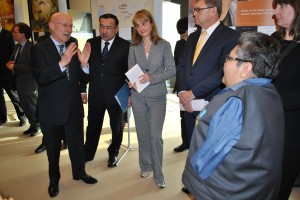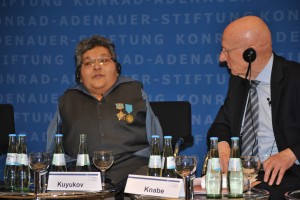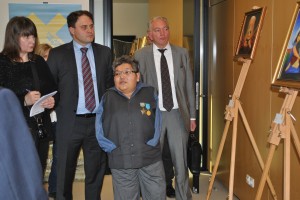 BERLIN, Dec. 4 – Kazakhstan’s efforts to advance global nuclear disarmament overall and specifically through The ATOM Project were in focus of German politicians and experts who came together for a Dec. 3 conference here at one of this country’s most respected institutions.
BERLIN, Dec. 4 – Kazakhstan’s efforts to advance global nuclear disarmament overall and specifically through The ATOM Project were in focus of German politicians and experts who came together for a Dec. 3 conference here at one of this country’s most respected institutions.
The conference, titled “Kazakhstan’s Role in Global Action against Nuclear Weapons,” took place at the Academy of the Konrad Adenauer Foundation and also featured a photo and art exhibition detailing the consequences of Soviet-era nuclear tests at Kazakhstan’s now-closed Semipalatinsk nuclear test site.
Members of the German Bundestag, representatives of ministries and government departments, members of Germany’s socio-political and scientific communities, NGOs and the media attended the event organized jointly by the Embassy of Kazakhstan in Germany and the Konrad Adenauer Foundation. Ambassador of Kazakhstan to Germany Nurlan Onzhanov, Ambassador-at-large of the Ministry of Foreign Affairs Roman Vassilenko, as well as The ATOM Project Honorary Ambassador and renowned Kazakh painter Karipbek Kuyukov presented the vision and the steps Astana has been pursuing in this arena.
The conference was well received by the German public and political circles, as well as anti-nuclear organizations, which expressed broad support for The ATOM Project, an initiative of President Nursultan Nazarbayev, as well as Kazakhstan’s nuclear disarmament and nonproliferation efforts as a whole. Nazarbayev announced the launch of The ATOM project in a speech at an international parliamentary conference in Astana on Aug. 29, 2012 as a mechanism to generate global public support for a final and irrevocable ban on nuclear weapons testing and for the ultimate eradication of nuclear weapons.
Before the start of the Dec. 3 conference in Berlin, a video produced by The ATOM Project was shown detailing Kazakhstan’s nuclear weapons legacy inherited from the former Soviet Union as well as the horrific consequences of nuclear testing in Kazakhstan, which adversely affected the health and fate of more than one and a half million people in the region.
In his remarks to the conference, Frank Priess, director for European and International Cooperation at the Konrad Adenauer Foundation, praised Kazakhstan’s role in global nuclear disarmament and stressed the timeliness and practical goals of The ATOM Project in the international anti-nuclear weapons effort.
Ambassador Onzhanov remarked on the global and historical significance of President Nazarbayev’s decision to close the Semipalatinsk nuclear test site and unilaterally disarm what was then the world’s fourth largest nuclear arsenal. The Kazakh diplomat also drew attention to the harmful humanitarian, economic and environmental effects of nuclear testing in Kazakhstan.
Ambassador-at-large Vassilenko presented The ATOM Project at the event, noting the consistent growth in broad international support for this initiative. According to Vassilenko, people from more than 100 countries have already signed its online petition calling for world leaders to end nuclear testing and bring the Comprehensive Nuclear Test Ban Treaty (CTBT) into force.
Support from the international community for Kazakhstan’s efforts can also be seen in the unanimous adoption in 2009 by the UN General Assembly, on the initiative of Kazakhstan, of a resolution declaring Aug. 29, the day of the closure of the Semipalatinsk test site in 1991, the International Day Against Nuclear Tests.
Vassilenko also noted that the example of nuclear disarmament President Nazarbayev has set is of particular relevance to the modern world which is still under threat from the further spread of nuclear weapons and their acquisition by terrorist organizations.
During a panel discussion at the conference, German Deputy Commissioner for Disarmament and Arms Control, Ambassador Christoph Eichhorn, noted the similarity of views the foreign ministries of the two countries share on this issue and stressed the importance of building multilateral efforts toward global nuclear disarmament. The German diplomat praised the outcome of an international conference in Astana in 2012, in which German Foreign Minister Guido Westerwelle participated.
Bundestag Deputy Jürgen Klimke, in warmly welcoming the Kazakh delegation on behalf of the German parliament, praised Kazakhstan’s steps in promoting the idea of global nuclear nonproliferation. He noted that Kazakhstan takes active and concrete actions according to the “do good things and speak about them” principle. Noting the dynamic and progressive development of economic cooperation between Kazakhstan and Germany, Klimke also stressed the importance of further joint efforts and close cooperation between the two states in the international arena in nuclear disarmament.
At the end of the event, ATOM Project Honorary Ambassador Kuyukov presented his paintings and reminded the audience of the tragic consequences of nuclear testing, which have impacted the lives of people in Kazakhstan, including his family. He urged support for The ATOM Project and Kazakhstan’s efforts to permanently end nuclear weapons testing and to free the world from all nuclear weapons.
The Konrad Adenauer Foundation is the largest political institution in Germany and adheres closely to the views and spirit of the ruling Christian Democratic Union (CDU). Holding the conference at such an authoritative political organization indicated broad support for the anti-nuclear initiatives of Kazakhstan by the German civil and political circles and created a solid foundation for the two countries to continue cooperative efforts in this sphere.
 During the discussion at the event, key issues related to the nuclear disarmament agenda were covered, including the future of U.S. tactical nuclear weapons stationed in Germany, security concerns of European nations and those of Russia, the future of the settlement of the Iranian nuclear programme, as well as efforts to help the survivors of nuclear testing in Kazakhstan.
During the discussion at the event, key issues related to the nuclear disarmament agenda were covered, including the future of U.S. tactical nuclear weapons stationed in Germany, security concerns of European nations and those of Russia, the future of the settlement of the Iranian nuclear programme, as well as efforts to help the survivors of nuclear testing in Kazakhstan.
“We all remember the famous Reagan-Gorbachev era expression, ‘Trust but Verify,’” Vassilenko said during the discussion moderated by one of Germany’s most respected and experienced reporters, Günter Knabe. “In modern circumstances, however, it would be perhaps more appropriate to say, ‘Verify but Trust,’ as it is obvious that the lack of trust, regionally and globally, is continuing to be the biggest factor hampering further meaningful steps along the road of global nuclear disarmament. As President Nazarbayev has said on numerous occasions, what is needed now more than ever is more trust among nations and peoples.”
“That is why we call and will continue to call for ‘vertrauen, vertrauen und vertrauen’,” Vassilenko said, meaning “trust, trust, and trust.”
